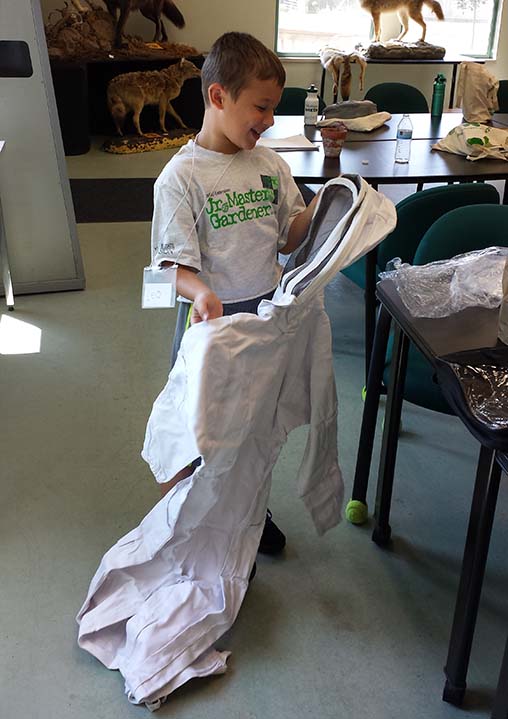“How do you get into this thing?”
That’s Leo Tavarone, a fourth-grader at Murray Lake Elementary School, as he tries to wiggle his way into a bee suit.
He needs to figure this out, because in a few minutes he and a dozen other students are going outside to visit about 250,000 bees at the Wittenbach/Wege Center in Lowell.
Usually, the Junior Master Gardener summer class sticks to simpler tasks such as picking vegetables. Today, however, the gardeners are dressing up like Apollo astronauts to investigate six bee hives kept in a fenced-in area on the property.
Tara Rogers has a bit more luck than Leo in getting into her protective suit. “Yeah! I feel like my dad at Amway!” exclaims the Murray Lake sixth-grader. “I’m ready!”
Center Director Meggan Johnson reassures them they have nothing to fear, shortly before she and beekeeper Charlie Knudstrup lead them out to the hives. “There will be a quarter million bees flying around you,” Johnson cautions them. “But we’ve done this four years and there’s never been a problem. Just be calm, cool and collected.”
Zucchini, bees and beetles
The hands- and suits-on lesson in beekeeping is part of a 10-week Junior Master Gardener program at the 140-acre Wittenbach/Wege Agriscience & Environmental Education Center, a program of Lowell Area Schools.
Designed for students entering fourth through seventh grades, the Master Gardener program teaches them how to cultivate plants in the center’s 11 garden plots, harvest them and sell them at the Lowell Farmer’s Market. Most of the vegetables were planted this spring by Lowell fourth-graders.
This summer’s class, which runs through Aug. 22, includes field trips to a farm stand and a day lily farm. Students take home workbooks and do experiments, such as how a Chinese rubber plant fares with different amounts of water. They also make a cookbook and win prizes for whoever plucks the most Japanese beetles from the garden.
Payton Corcoran, a sixth-grader at Forest Hills Central Middle School, planted a garden at his house along with younger brother Braden. “It’s a lot of fun to be able to just go outside of your house, take a zucchini and make zucchini bread,” Payton says.
On a recent morning the class picked zucchini, cucumbers and peppers and pulled fat garlic bulbs from the ground. Karin Maupin, a volunteer master gardener from Ada, helped them.
“This is the best program,” Maupin says. “The first week they didn’t want to touch the garden. Now look at the excitement.”
“Hey Miss M, check this out!” yells Braden Corcoran, proudly toting a bushel basket of squash. “I have a jackpot that I’ve harvested!”
Wellness through better beekeeping
The beekeeping education program is run in conjunction with Knudstrup, owner of Hannah’s Wholesome Honey in Lowell. Students formerly visited Knudstrup’s home to see his hives. This year Johnson bought six hives, bees, 30 suits and educational materials with a $3,000 grant from Lowell Community Wellness. The nonprofit uses funds from the Pink Arrow Project, a cancer-prevention initiative, to promote health education.
Knudstrup gives students a short course on the secret and not-so-secret lives of bees: the social organizationof the hive; the respective roles of queen, drone and worker bees; and the mysterious “waggle dance” of scout bees to describe possible new home sites. He also outlines the health benefits of honey, from anti-bacterial properties to treating tooth decay.
“Honey is nature’s medicine for us,” Knudstrup tells the class. As for those nasty stings, they’re usually a defense mechanism, he advises. “If you have bees bothering you, don’t swat at them,” he says. “Just leave.” 
As students troop into the hive area, the air soon is buzzing loudly with thousands of flying bees. No one freaks out. The students watch behind their masks as Knudstrup and Johnson pull out frames filled with honeycomb.
Leo Tavarone follows Johnson’s advice to stay cool and collected.
“OK, they’re swarming now,” he says, calmly.
Connect:








